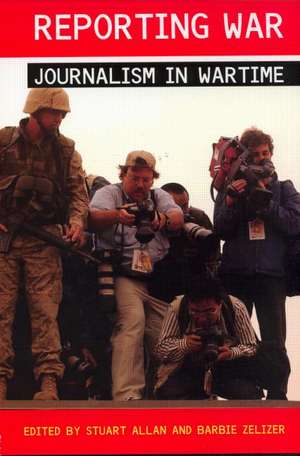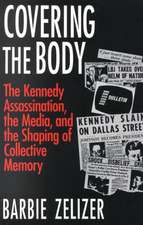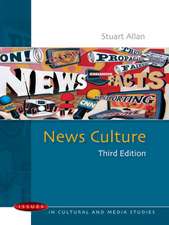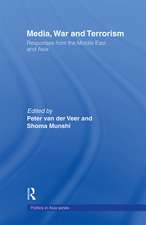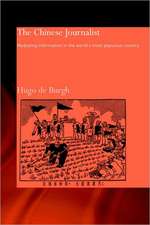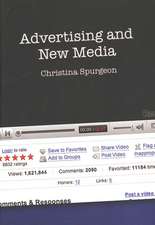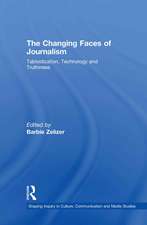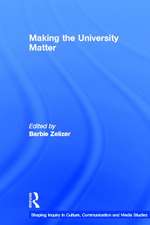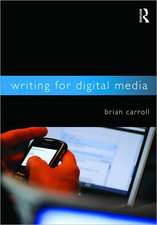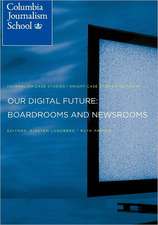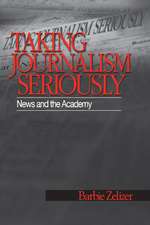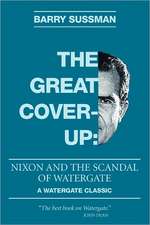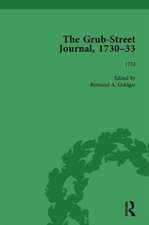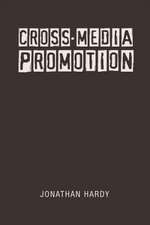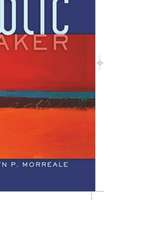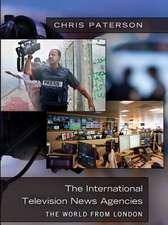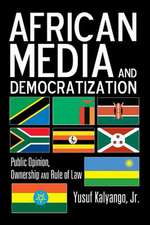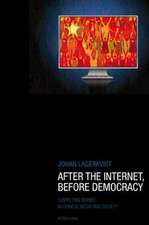Reporting War: Journalism in Wartime
Editat de Stuart Allan, Barbie Zelizeren Limba Engleză Paperback – 16 sep 2004
Each of this book's contributors challenges familiar assumptions about war reporting from a distinctive perspective. An array of pressing issues associated with conflicts over recent years are identified and critiqued, always with an eye to what they can tell us about improving journalism today.
Special attention is devoted to recent changes in journalistic forms and practices, and the ways in which they are shaping the visual culture of war, and issues discussed, amongst many, include:
- the influence of censorship and propaganda
- 'us' and 'them' news narratives
- access to sources
- '24/7 rolling news' and the 'CNN effect'
- military jargon (such as 'friendly fire' and 'collateral damage')
- 'embedded' and 'unilateral' reporters
- tensions between objectivity and patriotism.
| Toate formatele și edițiile | Preț | Express |
|---|---|---|
| Paperback (1) | 367.09 lei 6-8 săpt. | |
| Taylor & Francis – 16 sep 2004 | 367.09 lei 6-8 săpt. | |
| Hardback (1) | 1015.13 lei 6-8 săpt. | |
| Taylor & Francis – 9 sep 2004 | 1015.13 lei 6-8 săpt. |
Preț: 367.09 lei
Nou
Puncte Express: 551
Preț estimativ în valută:
70.25€ • 76.28$ • 59.01£
70.25€ • 76.28$ • 59.01£
Carte tipărită la comandă
Livrare economică 22 aprilie-06 mai
Preluare comenzi: 021 569.72.76
Specificații
ISBN-13: 9780415339988
ISBN-10: 0415339987
Pagini: 384
Ilustrații: 8 black & white illustrations, 10 black & white tables
Dimensiuni: 156 x 234 x 22 mm
Greutate: 0.71 kg
Ediția:New.
Editura: Taylor & Francis
Colecția Routledge
Locul publicării:Oxford, United Kingdom
ISBN-10: 0415339987
Pagini: 384
Ilustrații: 8 black & white illustrations, 10 black & white tables
Dimensiuni: 156 x 234 x 22 mm
Greutate: 0.71 kg
Ediția:New.
Editura: Taylor & Francis
Colecția Routledge
Locul publicării:Oxford, United Kingdom
Public țintă
UndergraduateNotă biografică
Stuart Allan is a lecturer in the School of Cultural Studies at the University of the West of England. His books include News Culture (Open U 1999) and Media, Risk and Science. (Open U.P. 2002) He edits the series Issues in Cultural and Media Studies for Open U. P., now McGraw-Hill. He has co-edited a number of collections including News, Gender and Power (Routledge 1998), Environmental Risks and the Media (Routledge 2000) and Journalism after September 11 (with Barbie Zelizer) Routledge 2002.
Barbie Zelizer is the Raymond Williams Professor of Communication at the Annenberg School of Communication in Philadelphia. She is the author of several books on journalism, popular culture and coll-ective memory, and co-edited Journalism after September 11. She is a founder and co-editor of the Sage journal Journalism: Theory, Practice and Criticism.
Barbie Zelizer is the Raymond Williams Professor of Communication at the Annenberg School of Communication in Philadelphia. She is the author of several books on journalism, popular culture and coll-ective memory, and co-edited Journalism after September 11. She is a founder and co-editor of the Sage journal Journalism: Theory, Practice and Criticism.
Cuprins
Introduction; 1: Rules of Engagement; 1: War in the Twenty-First Century; 2: Understanding; 2: Information Warfare in an Age of Hyper-Militarism; 3: A Moral Imagination; 4: The PR of Terror; 5: Researching US Media–State Relations and Twenty-First Century Wars 1; II: Bearing Witness; 6: When War is Reduced to a Photograph; 7: The Persian Gulf TV War Revisited; 8: Tribalism and Tribulation; 9: Humanizing War; 10: Prisoners of News Values?; 11: Out of Sight, Out of Mind?; 12: The Battlefield is the Media; III: Reporting the Iraq War; 13: Militarized Journalism; 14: War or Peace?; 15: How British Television News Represented the Case for the War in Iraq 1; 16: European News Agencies and their Sources in the Iraq War Coverage; 17: Al-Jazeera and War Coverage in Iraq; 18: Big Media and Little Media; 19: The Culture of Distance
Descriere
Reporting War explores the social responsibilities of the journalist during times of military conflict. News media treatments of international crises are increasingly becoming the subject of public controversy, and discussion is urgently needed.
